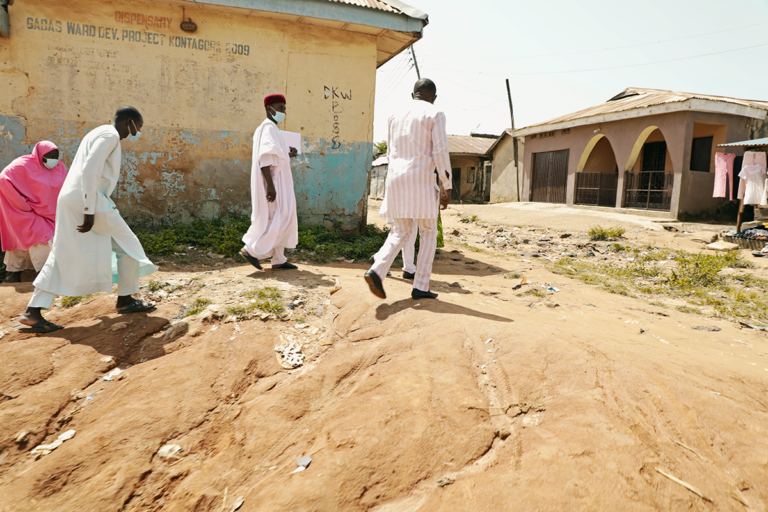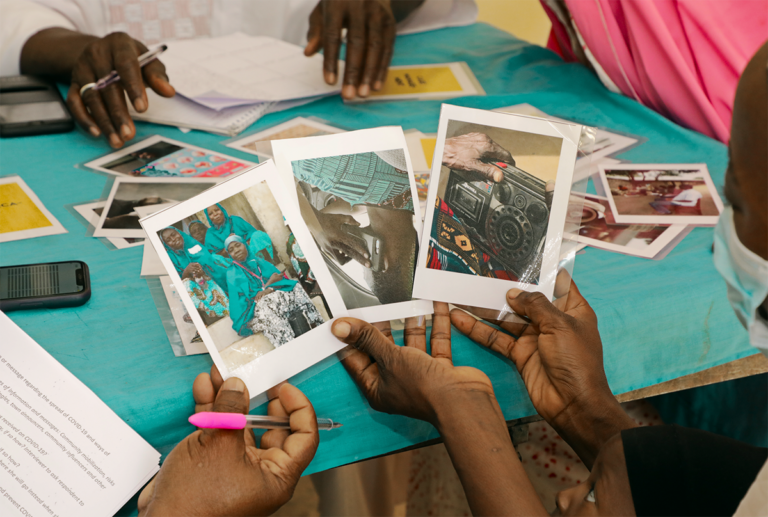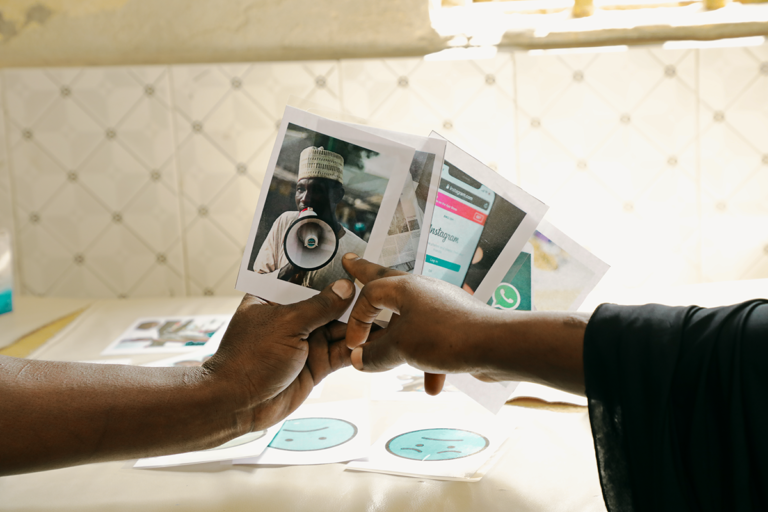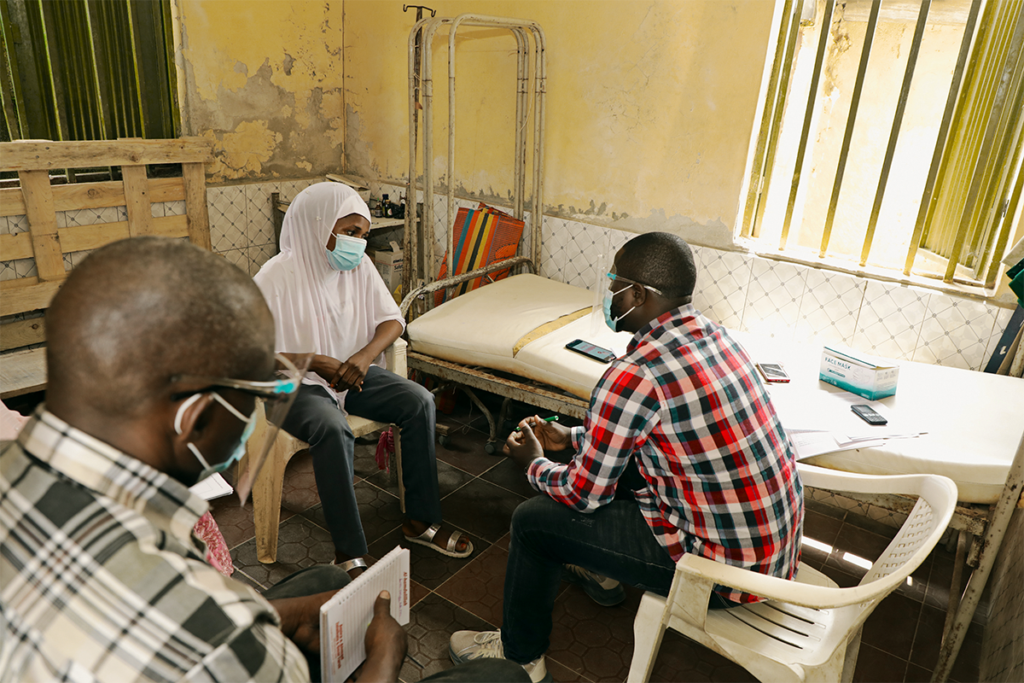Innovation begins with empathy and understanding.
As part of the Core Nigeria project, Scope is supporting public health professionals from Lagos and Niger states to apply the human-centered design (HCD) process to improve primary healthcare services disrupted by the COVID-19 pandemic. For the experiential HCD learning project, participants are working through the four stages of HCD—Discover, Define, Create, and Test—in Design Clinic to develop their own innovative solutions to implement and scale. During the programme, participants take part in guided activities, mentoring workshops and use HCD methods to engage with and better understand the different actors involved. Participants also learn about the competencies and mindsets that are central to the HCD approach, such as empathy, open-mindedness, and being action-oriented.
Scope is conducting the Core Nigeria Design Clinic in partnership with Nigerian teams consisting of Lagos and Niger state health officials as well as programmatic staff from the Clinton Health Access Initiative in Nigeria and the Bill and Melinda Gates Foundation Nigeria Country Office.
 The Niger state participants visits Kotagora primary healthcare centre to conduct design research with patients and staff.
The Niger state participants visits Kotagora primary healthcare centre to conduct design research with patients and staff.
Refining problem statements
Design Clinic participants began by taking a wide lens and identifying a range of different challenges to primary healthcare that have been brought about by the COVID-19 pandemic. The participants then used collaborative ranking exercises to narrow down options and craft a focused problem statement to address through an HCD approach. This use of divergent and convergent thinking is a key characteristic of the HCD process and for many participants was a novel approach that they felt added value to their work. “I think one of the things the Design Clinic has done, is just making you see the whole public health experience in a whole different light,” said one Design Clinic participant. “Even though you have several challenges, you have to look at what you can prioritise at that point in time for you to be able to get the desired outcome.”

Community leaders in Niger state share their opinions on effective communication channels by participating in a card sorting exercise.
The Niger state participants decided to work toward improving the delivery of maternal, newborn, and child health services disrupted by COVID-19, while the Lagos team is focusing on addressing declines in routine immunisation rates brought about by the pandemic.
“I think one of the things the Design Clinic has done, is just making you see the whole public health experience in a whole different light.” -Design Clinic participant
Participants then learned about design research and how to apply these methods to immerse themselves in a context in order to better understand and empathise with the people connected to their selected design challenge. They also learned about the benefits, limitations, and complementarities of the agile design research approach compared to the traditional public health research that was familiar to many of them. Scope worked with participants to select design research activities, develop facilitation guides, and co-create contextualised versions of design tools.
Design research in action
The Lagos state participants visited two primary healthcare centres to interview healthcare workers and caregivers of children under five years old, as well as community leaders from the surrounding area. The group utilised the card sorting tool, in which participants prioritise issues depicted on cards and discuss their reasoning, as well as personas, and the People, Objects, Environments, Messages, and Services (POEMS) tool, which guides a structured observation of complex environments and processes.
The Niger state participants conducted interviews and focus groups supplemented by personas and card sorting tools at two primary healthcare centres, also working with healthcare workers, caregivers, and community leaders, as well as pregnant women. They also used the POEMS and five senses tools to record their observations at the sites. Both groups explored how fears and restrictions brought about by the COVID-19 pandemic had impacted their selected healthcare services, as well as learning about the key influencers of healthcare-related decisions. By working with different levels of the system, including healthcare workers, patients, caregivers, and community leaders, the design researchers sought to develop a more comprehensive understanding of the different actors and their unique needs.
 The Design Clinic participants in Lagos gathers feedback from healthcare workers using a locally contextualised card sorting tool.
The Design Clinic participants in Lagos gathers feedback from healthcare workers using a locally contextualised card sorting tool.
Moving from research findings to guiding insights
Next, the participants will move into the Define phase of the HCD process in which they synthesise design research findings and transform them into holistic insights that will guide the rest of their design work. This stage will also involve bringing together diverse stakeholders to provide feedback on, and validate research findings. The result will be actionable insights, visual journey maps, and profiles to help inspire the brainstorming and co-creation of innovative solution concepts. In the coming months, Scope will support the Design Clinic participants in building prototypes of proposed innovations and iterating them based on feedback, before testing and launching the new solutions in their intended context.
Learn more about Core Nigeria and follow us on Facebook and Twitter for more updates.
Back to news